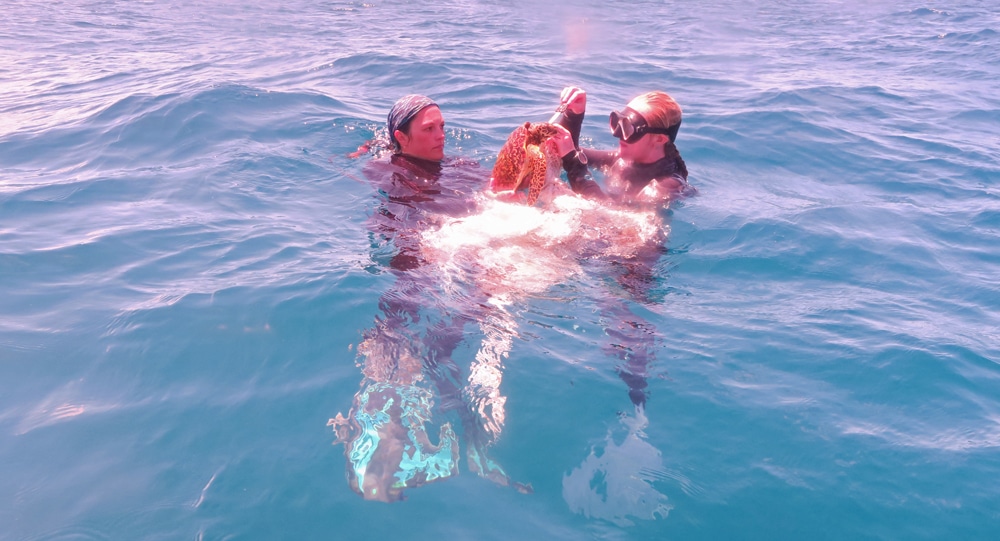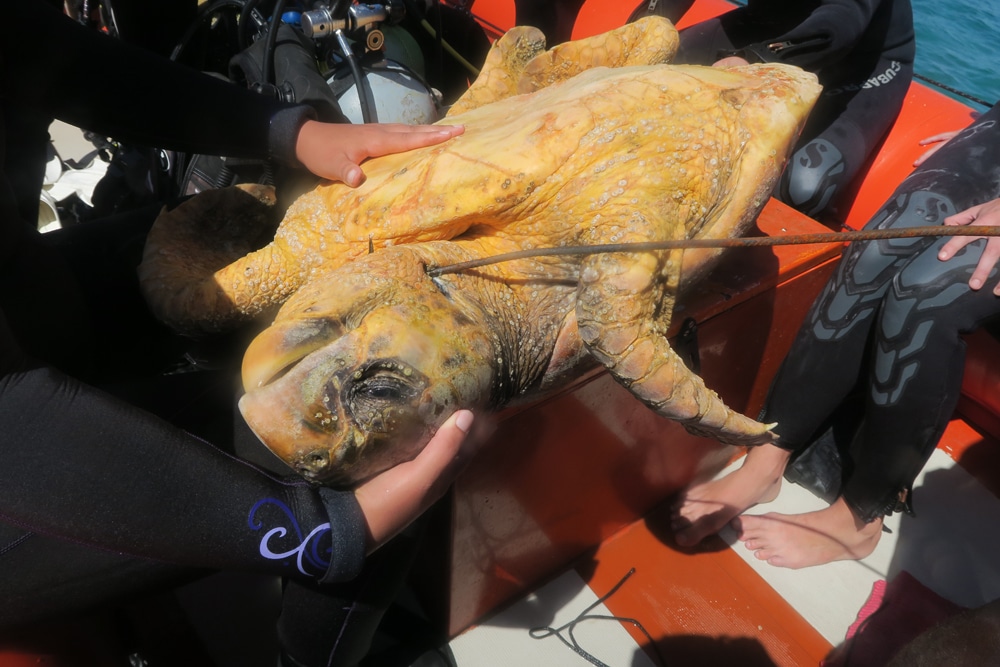Marine Life & Conservation
Shocking images highlight importance of marine conservation work

 This week, marine conservation charity the Marine Megafauna Foundation (MMF) was shocked to find not one but two turtles severely hurt as a result of human activity.
This week, marine conservation charity the Marine Megafauna Foundation (MMF) was shocked to find not one but two turtles severely hurt as a result of human activity.
One of the charity’s volunteers – Genaye Domenico – was scuba diving with Peri-Peri Divers in Tofo Beach, Mozambique, when they came across a juvenile hawksbill turtle caught in plastic. Genaye and Peri-Peri dive instructor Helen Armstrong worked together to quickly free the turtle and release it back to the ocean.
Soon after, they found a loggerhead sea turtle – still alive – with a speargun piercing its neck. They carefully took hold of the injured turtle and were able to remove the spear. Luckily, the spear didn’t seem to have pierced any vital organs and, once returned to the ocean free of the painful spear, the turtle dived down and swam away.
Marine Megafauna Foundation volunteer Genaye Domenico, 30, who was on the boat, said: “Today, while on the way back in from my dive with Peri-Peri Divers, we spotted a juvenile hawksbill turtle tangled in a plastic woven bag which we cut loose. Quickly after, we found a young loggerhead sea turtle with a spear through its neck. We were able to grab the loggerhead, lift it into the boat and secure the turtle while we awaited a second boat to deliver us wire cutters, as the spear was fully attached to the spear gun. Wire cutters were delivered, the spear was cut, pulled through the neck, and the loggerhead was released to the sea. Both turtles, after being helped, immediately dove deep into the sea. The spear has been given to the police.”
The area’s Community Fisheries Council (CCP) – represented in this situation by Mr. Songane – and coastal police were quick to respond, taking the speargun into evidence and launching an investigation.
According to the IUCN Red List of Threatened Species, loggerhead turtles are currently listed as vulnerable and hawksbill turtles are critically endangered. These horrific images highlight how not only plastic but other human activities threaten these beautiful but endangered creatures.
Jess Williams, Marine Conservation Biologist and Director of Tartarugas Para o Amanhã/ Mozturtles, said: “Despite legal protection for sea turtles within Mozambique, illegal take is still widespread. Small scale fisheries (SSF) are extensive throughout coastal waters along Mozambique’s entire 2,700 km coastline, which happens to be the habitat for five of the seven species of sea turtles. Sadly, targeted hunting by spear-fishers and opportunistic by-catch is an ongoing problem and we believe hunting pressures on sea turtles may be increasing.”
According to Mozturtles, October to February is nesting season for loggerhead turtles from Bazaruto Archipelago south to Ponta do Ouro Marine Partial Reserve. During this time, there is likely to be an increase of loggerhead turtles (Caretta caretta) moving into coastal waters to lay their eggs as they migrate back into the area.
“It’s particularly concerning to see animals in this life-stage facing threats such as targeted hunting, bycatch or entanglement,” Williams continued. “Turtles reach maturity around 20-30 years of age and each female lays approximately four nests in the season so mature individuals being removed from the breeding stock causes significant problems to turtle populations. It’s crucial that efforts are made to accurately quantify the impacts of SSF here in Mozambique, and in other countries in the region, to enable us to accurately understand the scale of the threat to sea turtles at a regional level.”
Mariana Coelho, MMF’s Mozambique Country Director, said: “We were all shocked and saddened to find these two injured turtles in the bay within minutes of each other. Thanks to the quick responses of the volunteers and staff on the boat, these beautiful animals were able to be rescued and released back into the ocean. We expect they will now visit a cleaning station to prevent infection in their open wounds and hope both animals will recover fully.
Coelho continued: “It’s important to remember that acts like this, while shocking, are driven by extreme poverty. That’s why MMF is working to raise awareness among the local community about the importance of marine conservation as well as helping fisher families to find new, sustainable ways of generating a livelihood. We hope the police will be successful in their mission to find out who can be held accountable, that the community continues their incredible efforts in changing harmful habits and appeal to the general public for support in our work to protect our oceans from acts such as these.”
MMF works with the local community in Tofo, and neighboring communities, to help them improve sustainable fishing practices and ocean conservation. The charity’s vision is a world in which marine life and humans thrive together and they aspire to attain it by saving threatened marine life.
Photo credit: Helen Armstrong, Peri-Peri Divers
For more information about MMF and how you can support, please visit their website by clicking here.
Marine Life & Conservation
Paul Watson Released as Denmark Blocks Japan’s Extradition Bid

Renowned anti-whaling activist Paul Watson has been released from custody in Greenland after spending five months in detention. Denmark’s Justice Ministry rejected Japan’s request for his extradition, citing insufficient guarantees that his time already served in custody would be credited against any potential sentence.
The 74-year-old Canadian-American was arrested on July 21 in Nuuk, Greenland’s capital, when his ship docked to refuel. His arrest was based on a 2012 Japanese warrant related to a 2010 encounter in Antarctic waters. Japan alleged Watson obstructed operations and caused damage to a whaling research ship during efforts to disrupt illegal whaling. Watson has consistently denied these claims, maintaining his commitment to marine conservation.
Denmark, which oversees extradition matters for Greenland, concluded that while the legal conditions for extradition were met, the lack of assurances from Japan regarding time-served credit made extradition untenable.
In a video shared by his foundation, Watson expressed gratitude and relief, saying, “After five months, it’s good to be out… and good to know they’re not sending me to Japan.” He added that the most difficult part of his time in custody was being separated from his two young sons.
Watson is a pioneering figure in marine conservation, known for founding the Captain Paul Watson Foundation in 2022 after decades of activism with the Sea Shepherd Conservation Society. His bold efforts to defend marine life have earned him widespread support, including from celebrities and conservationists. His work has also been featured in the acclaimed reality TV series Whale Wars.
Watson’s lawyer, Jonas Christoffersen, praised the decision, stating, “We are happy and relieved that Paul Watson is now free.” He added that Watson is eager to reunite with his family and continue his vital work.
The arrest occurred while Watson’s vessel, the M/Y John Paul DeJoria, was en route to the North Pacific with a team of 26 volunteers to intercept a Japanese whaling ship. His foundation described the arrest as politically motivated and emphasized that Watson’s actions were focused on ending illegal whaling practices.
Japan resumed commercial whaling in 2019 after leaving the International Whaling Commission, asserting that whale meat is a cultural tradition. Conservationists, however, continue to challenge these practices, highlighting their impact on marine ecosystems.
Despite the challenges, Watson remains steadfast in his mission to protect marine life and bring attention to whaling practices. His dedication to ocean conservation has made him a globally respected advocate for the environment.
Marine Life & Conservation
12 Days of Zero-Waste Fish-mas

This holiday period, the Marine Conservation Society, the UK’s leading ocean membership charity, invites you to make some simple changes to eating fish this Christmas to help our seas.
Dr Kenneth Bodles, Head of Fisheries and Aquaculture at the Marine Conservation Society, said, “During the festive season, our consumption increases, but so does waste. Sustainability isn’t just about where food comes from – it’s also about how you use it. By reducing waste and making the most out of your seafood, you’re not only taking steps to be more ocean-friendly, but can also help to cut costs during what is often one of the most expensive times of the year”.
The Marine Conservation Society has compiled twelve tips on how to consume seafood sustainably with zero-waste this Christmas:
Buy whole fish instead of fillets
Instead of fillets, consider buying whole fish such as salmon, hake, or lemon sole. By adopting a “nose to tail” approach with cooking, whole-baked fish not only feeds a crowd, but also helps to minimise waste and maximise sustainability by using up every part of the animal, including bones, skin, and fat.
Make fish stock
Leftover fish bones or shells can be put to good use by boiling them to make a nourishing fish stock or bisque. This can be frozen and preserved for later use and makes for a flavourful base in a soup.
Make your own fish pâté
Avoid waste by turning leftover fish, such as smoked mackerel or salmon, into a delicious pâté by blending with cream cheese and lemon. Perfect when paired with crackers.
The sustainability of salmon and mackerel varies depending on where and how it is caught or farmed. For more information on green-rated options, check the charity’s Good Fish Guide.
Buy frozen
By purchasing seafood that is frozen or vacuum-packed, this helps to reduce waste by extending the shelf life of your food.
Fish pie
If you’re wondering what to do with leftover cooked fish, why not opt for a classic fish pie with mashed potatoes, leeks, and a cheesy sauce? A sure crowd pleaser on Boxing Day.
Use the head
Don’t forget the fish head! The meat is incredibly tender and flavourful. The charity recommends a cod’s head curry or recreating Fallow’s renowned cod’s head in siracha butter.
By stretching your ingredients further, not only is this a more sustainable way to enjoy seafood, but also cost-effective by repurposing leftovers and cooking creatively.
Boxing Day brunch
Mix leftover kippers or smoked salmon with scrambled eggs for a tasty, zero-waste, Boxing Day brunch.
For best choice, make sure you buy kippers, or herring, from the North Sea and the North Irish Sea.
Zero-waste storage
A top tip from the Marine Conservation Society to avoid waste is freezing fish offcuts to save for future use.
Crisp up the skin
Even leftover fish skin can be turned into a quick savoury snack by crisping it up in an air fryer with a little olive oil and salt.
Anchovies two ways
Leftover anchovies can either be blended with butter to make a delicious anchovy butter or tossed into pasta for a hit of umami flavour.
The charity recommends opting for anchovies caught in the Bay of Biscay for best choice.
Fishcakes
For an easy, zero-waste meal, leftover seafood trimmings can be mixed with mash and fried in breadcrumbs to make fishcakes.
Pickled mussels
Try pickling mussels in 1:1 vinegar and water, with a dash of sugar for a sustainable, zero-waste snack that can be enjoyed well beyond the festive season.
Mussels farmed in the UK are a seafood superhero. Grown using low-impact methods and harvested by hand, they get all the food they need from the sea around them. This makes them one of the most sustainable, ocean-friendly, and cost-effective seafood options.
Players of People’s Postcode Lottery have raised £6.6M towards the Marine Conservation Society’s vital work in making seafood more sustainable.
Laura Chow, Head of Charities at People’s Postcode Lottery, said: “Fish is a festive favourite for many, but making sustainable choices when it comes to how we buy and eat seafood makes all the difference for our ocean. Support from players of People’s Postcode Lottery has helped the Marine Conservation Society further its sustainable seafood work, so that we can all enjoy healthier, better protected seas.”
The Marine Conservation Society encourages you to make sustainable seafood choices a year-round habit, not just for Christmas. To check how sustainable the seafood on your plate is, you can visit the charity’s Good Fish Guide. The Guide helps consumers and businesses identify the most sustainable seafood using a simple traffic light system, based on where and how species are caught or farmed. Green is the best choice, amber means improvements are needed, and red indicates fish to avoid buying.
Zero-waste gift idea
Why not embrace a zero-waste Christmas by gifting a membership to support marine conservation? It’s a meaningful, low-waste gift that helps protect our ocean for generations to come. Memberships start from as little as £5 a month – the price of a sandwich and drink from your local coffee shop.
Find the latest sustainable seafood advice for wild-caught and farmed seafood on the Good Fish Guide, downloadable to your phone from www.mcsuk.org/goodfishguide.
-

 News2 months ago
News2 months agoIconic SS United States to become the World’s Largest Artificial Reef
-

 News3 months ago
News3 months agoBook Review – 52 Assignments: Underwater Photography
-

 Gear News3 months ago
Gear News3 months agoDYNAMICNORD – New German diving brand enters the British market
-

 News3 months ago
News3 months agoExploring Cenote El Pit: A Diver’s Dream
-

 Gear News3 months ago
Gear News3 months agoTry BARE drysuits (and maybe even win one!) this Friday with Sea & Sea at North West Dive Fest
-

 Marine Life & Conservation3 months ago
Marine Life & Conservation3 months agoBook Review: Coral Triangle Cameos
-

 Blogs2 months ago
Blogs2 months agoDive the Egyptian Red Sea this Autumn with Regaldive
-

 News3 months ago
News3 months ago2024 Ocean Art Underwater Photo Competition Announced




